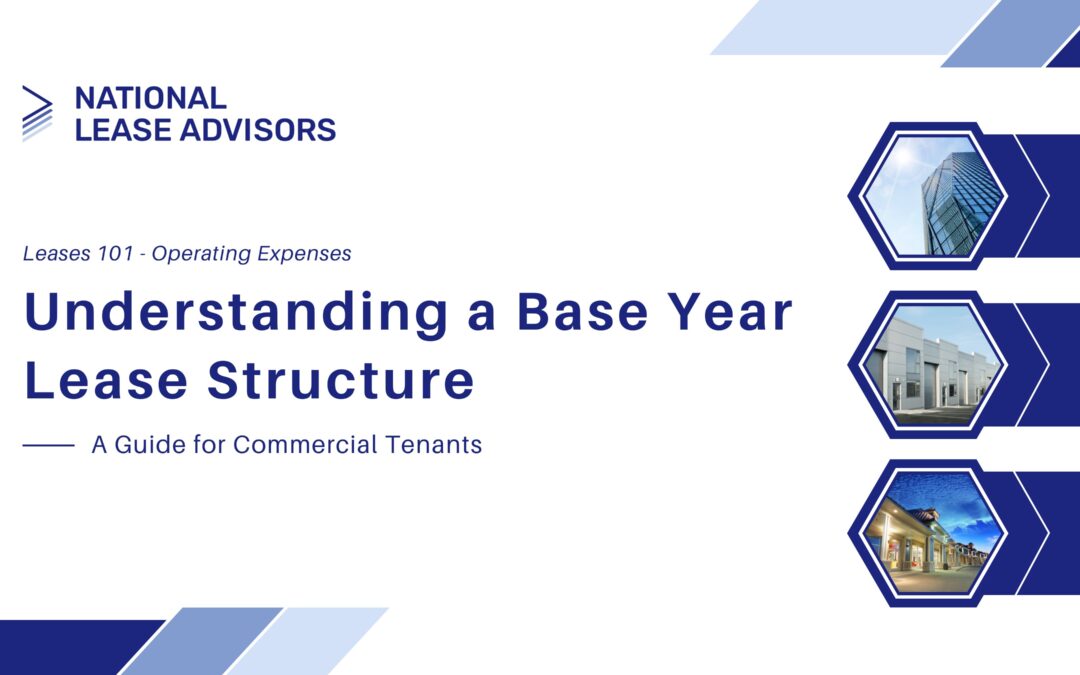Commercial real estate leases can be complex, and there are many terms and provisions that tenants need to understand to negotiate the best deal for their business. One of the common lease structures used in commercial real estate is the base year lease. In this article, we will explore what a base year lease is and how it works.
Base Year Overview
A base year lease is a type of commercial real estate lease where the tenant pays a base rent that is calculated based on the property’s operating expenses in a specified base year. The tenant is then responsible for any increases in operating expenses above the base year amount. For example, if the base year is 2023 and the operating expenses for the property in 2024 increase, the tenant would be responsible for paying the difference between the 2023 base year amount and the 2024 operating expenses.
The below example shows what a 10,000 square foot tenant would expect to pay over a 5-year lease at a building with $10 per square foot in operating expenses increasing at 5% per year.

Which Year is the Base Year?
The base year for a lease can be any year agreed upon by the landlord and the tenant. Typically, the base year is the first year of the lease term, but it can also be a different year specified in the lease. In leases signed in the second half of the year, we encourage tenants to push for the base year to be the following year.
Which Expenses Are in the Base Year?
This will depend on the lease. Some lease include all operating expenses in the base year, while others might include a particular expense or expenses. A full service lease with a base year will have all operating expenses included in the base year. A modified gross lease will have some expenses with a base year and other expenses passed through to the tenant without a base year. A common modified gross lease structure is to have a base year for taxes, insurance, and common area maintenance, but have utilities and janitorial paid separately. We’ve seen almost every combination, so it’s important to review the lease to be sure what is included.
Advantages of a Base Year
One of the advantages of a base year lease is that it can provide some predictability for tenants in terms of operating expenses. By knowing the base year amount, tenants can budget and plan for any potential increases in operating expenses. Base year leases can also be simpler for tenants since they only need to pay attention to increases in operating expenses above the base year amount.
Disadvantages of a Base Year
However, there are also some potential disadvantages to base year leases. Without protections in the lease, operating expenses can increase significantly above the base year amount. Tenant’s are also sometimes surprised about the increase in operating expenses they have to pay year over year on a percentage basis. See the example above where the expenses passed on to the tenant more than double even though building operating expenses only increased 5%.
Protections to Negotiate to Limit Increases
To protect themselves, tenants should carefully review the operating expense provision of their commercial real estate lease and negotiate the terms to ensure that they are getting a fair deal without costly surprises. It’s always prudent to negotiate a cap on operating expense increases and have certain expenses, such as capital repairs, excluded from the definition of operating expenses in the lease.
Auditing a Base Year Lease
It’s important for companies to review their operating expense reconciliations and budgets to ensure they are consistent with lease terms. NLA provides lease audit services to companies and consistently recover over $1,000,000 annually for clients.
Summary
To summarize, a base year lease is a common type of commercial real estate lease where the tenant pays a base rent calculated based on the property’s operating expenses in a specified base year. While base year leases can provide predictability for tenants, without lease protections they can also result in significant rent increases if operating expenses rise substantially above the base year amount. Tenants should carefully review and negotiate the terms of the lease to ensure that they are getting the best deal for their business.
About National Lease Advisors: National Lease Advisors is a leading provider of lease administration services, specializing in helping businesses effectively manage their real estate portfolios. Their comprehensive range of services includes CAM reconciliation reviews, lease audits, rent statement analysis, and lease accounting. With a focus on quality service and client satisfaction, National Lease Advisors helps clients manage their lease portfolios effectively, reducing costs and optimizing their real estate strategy.

